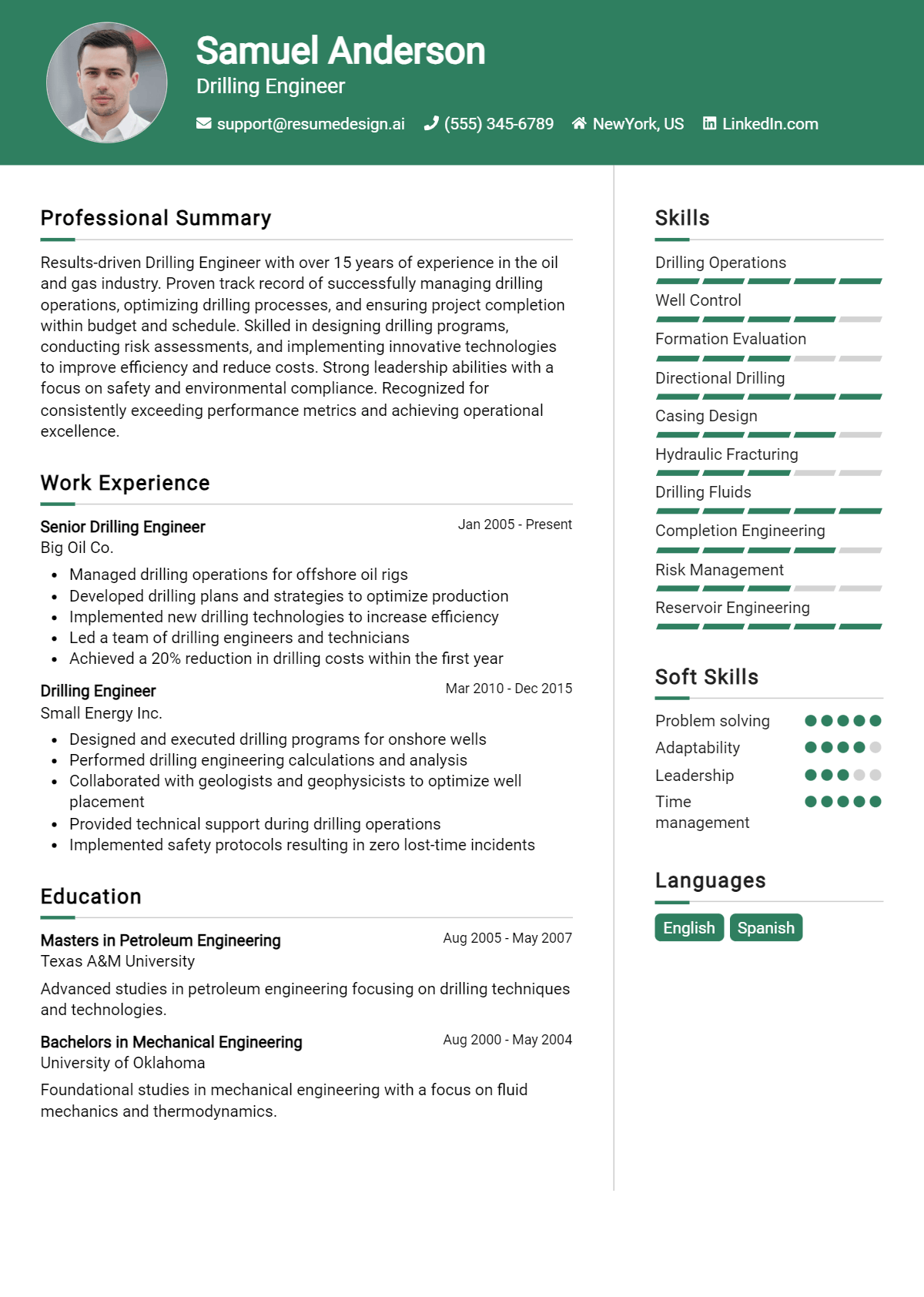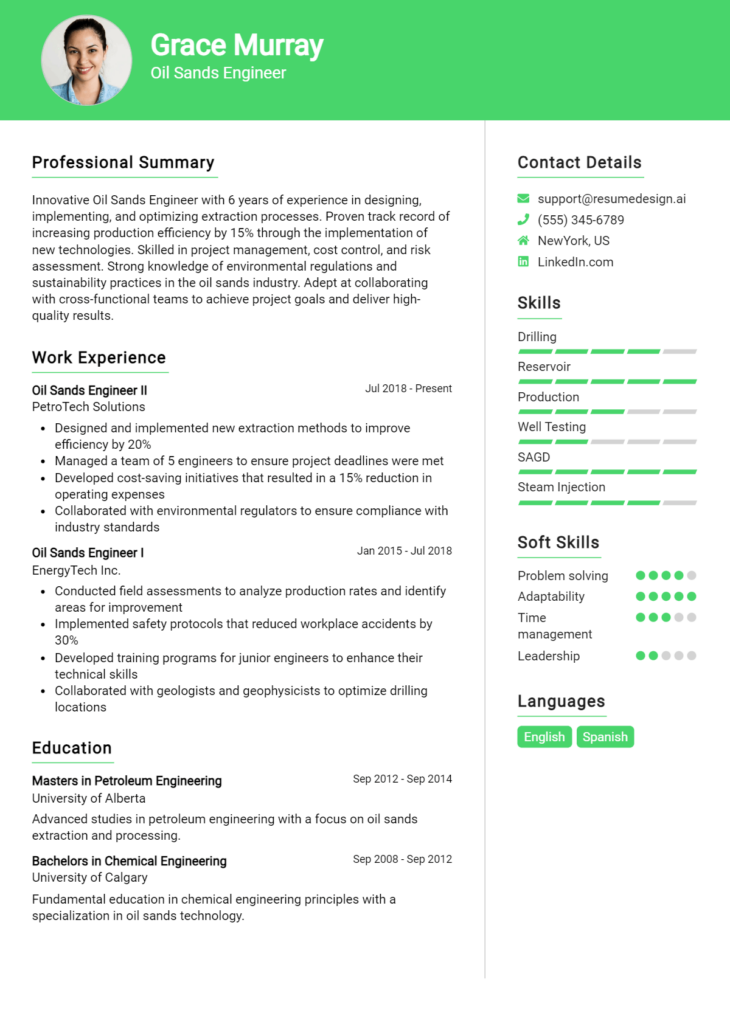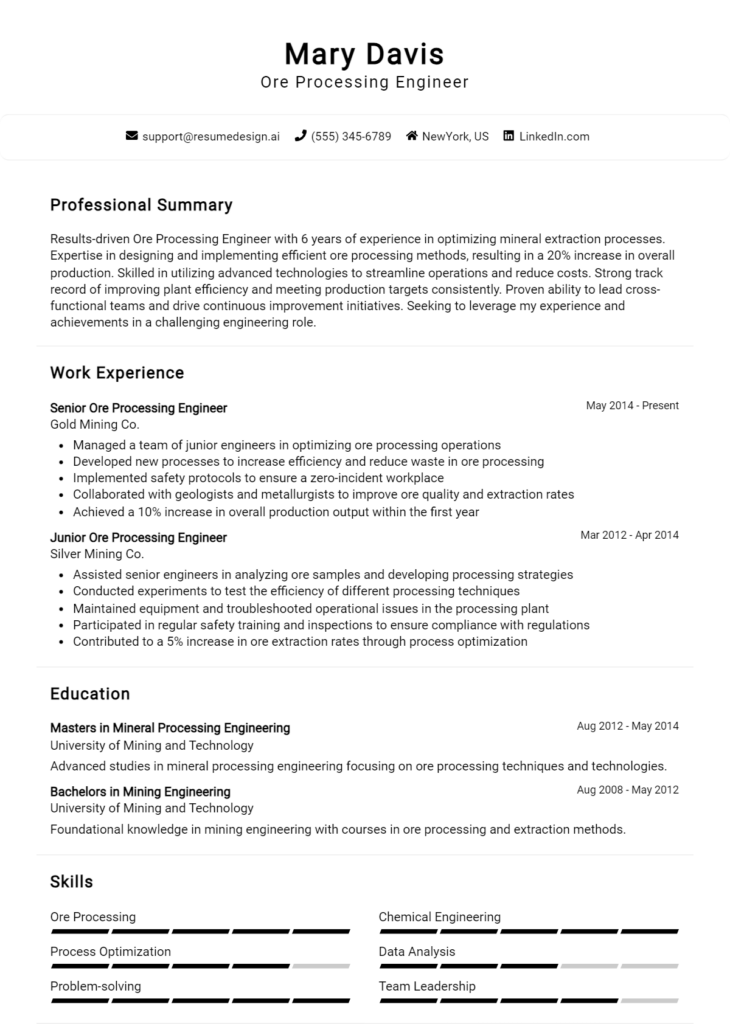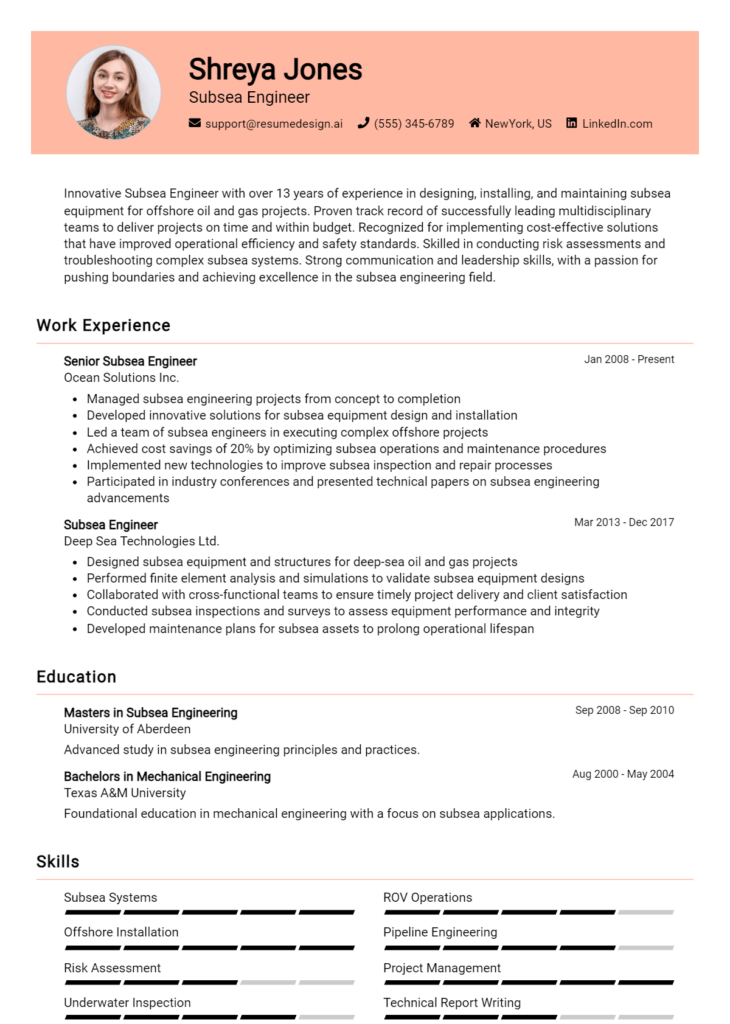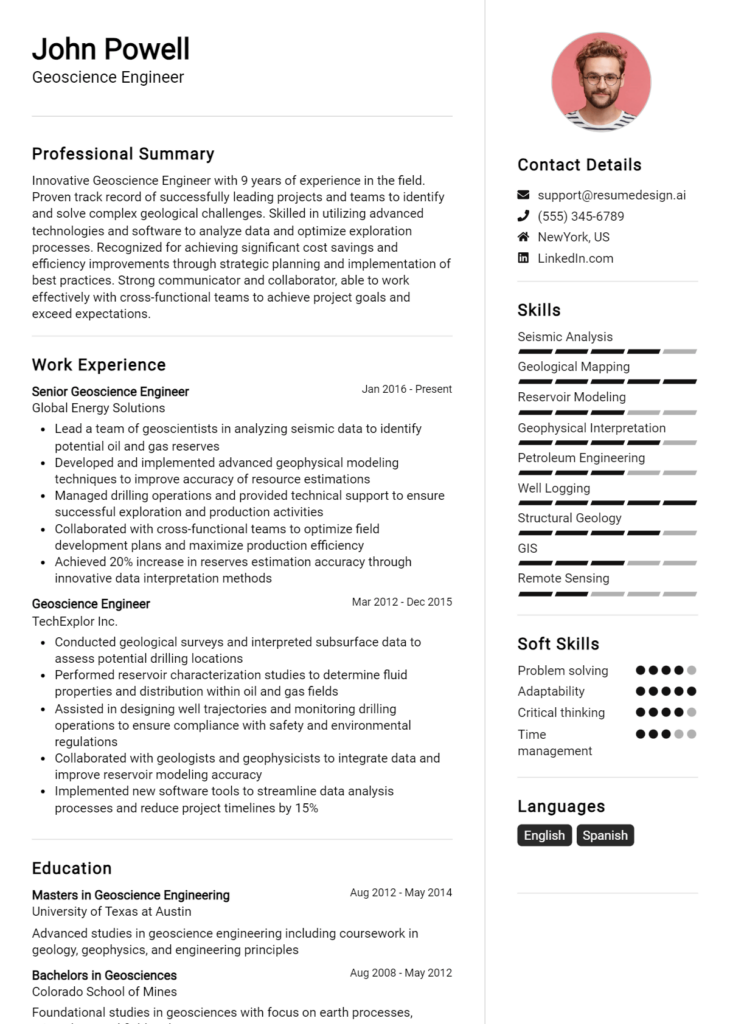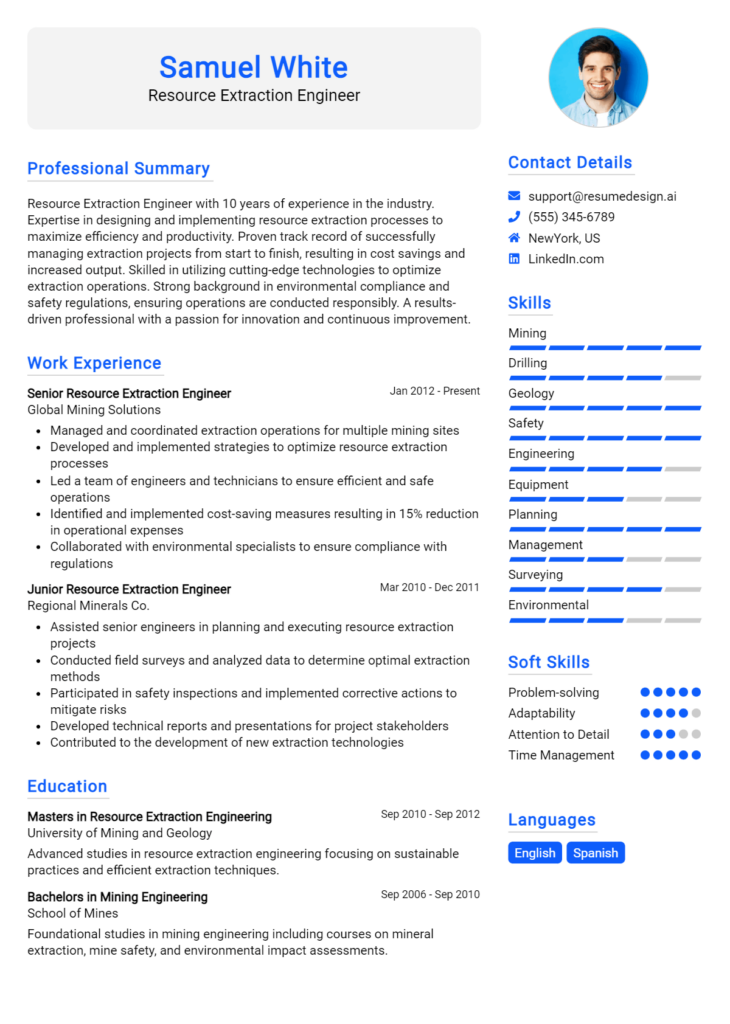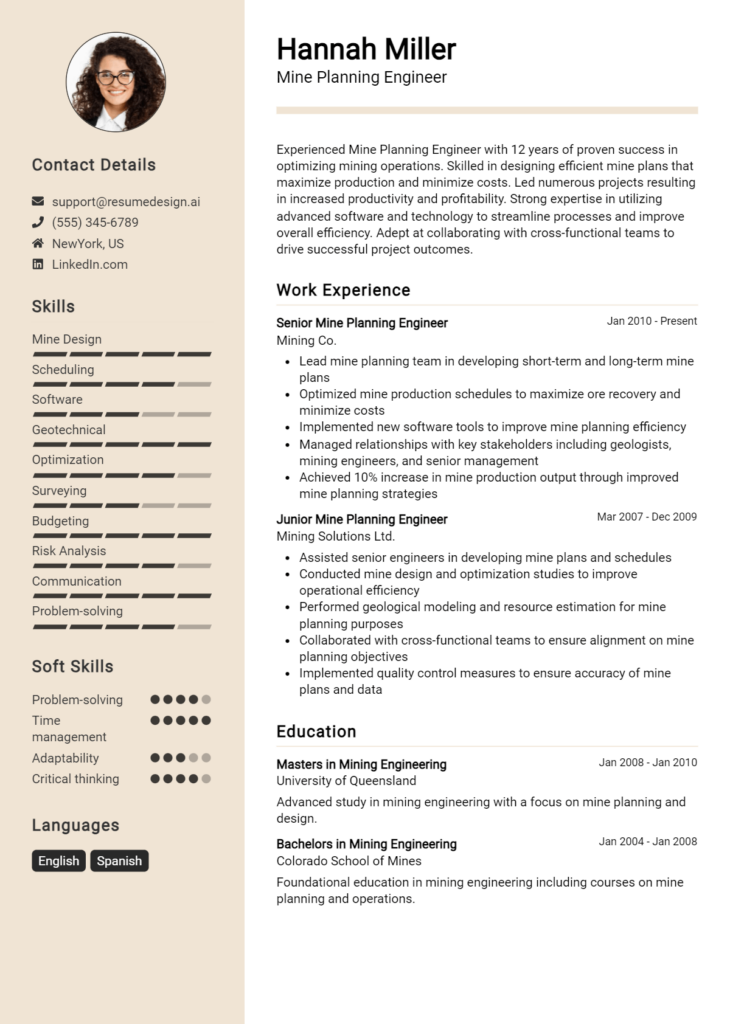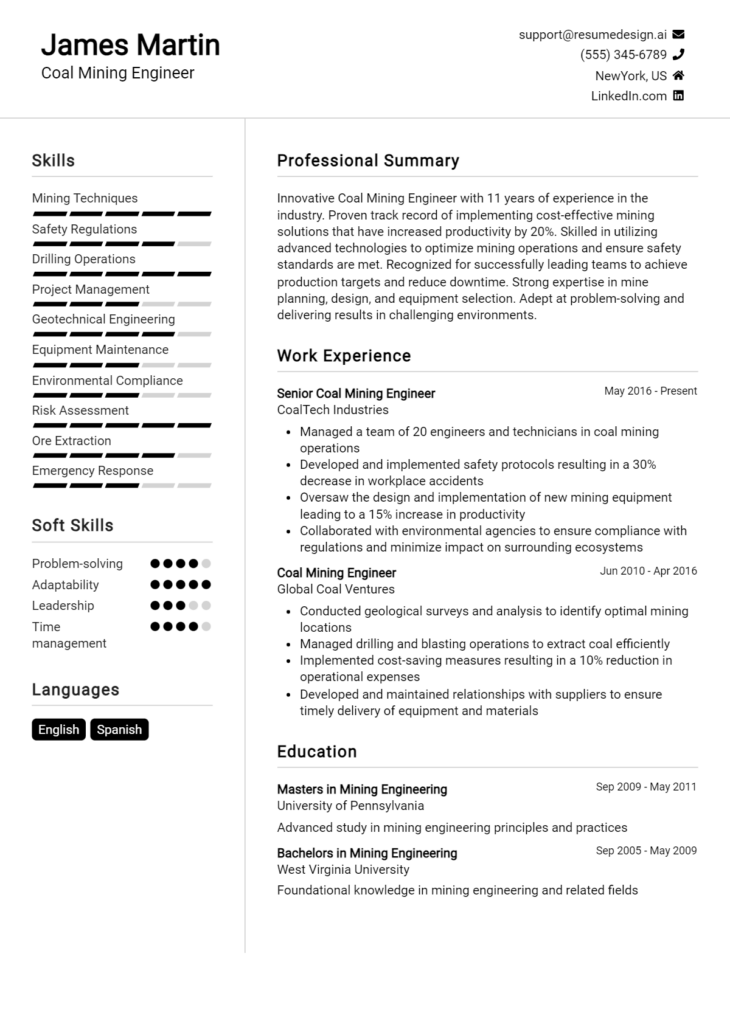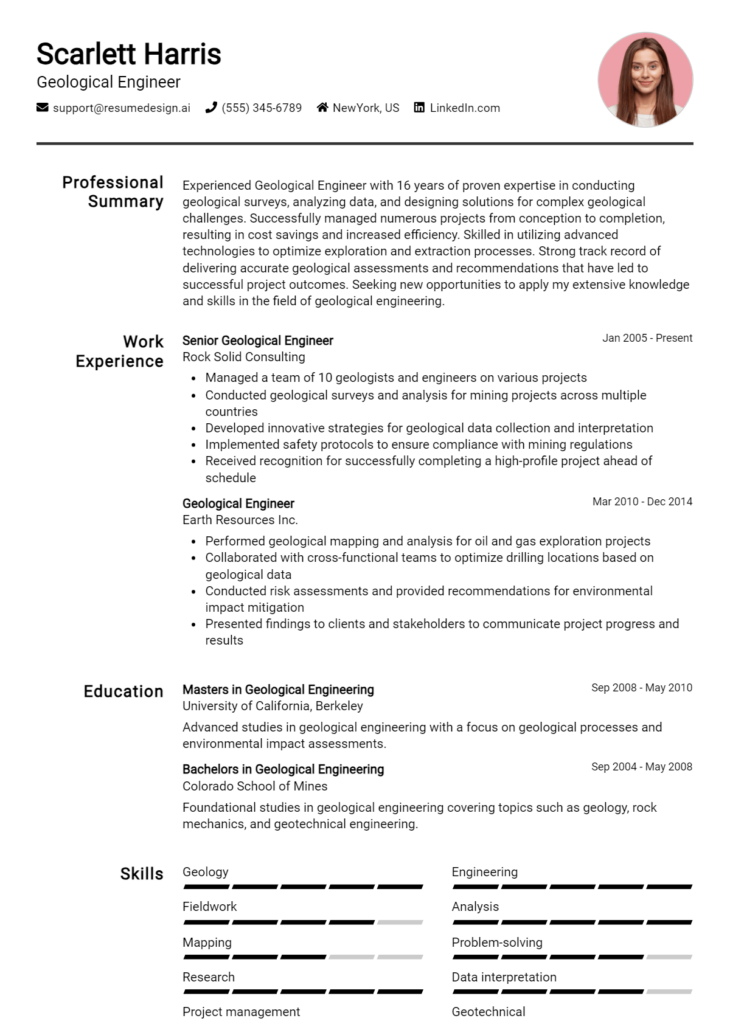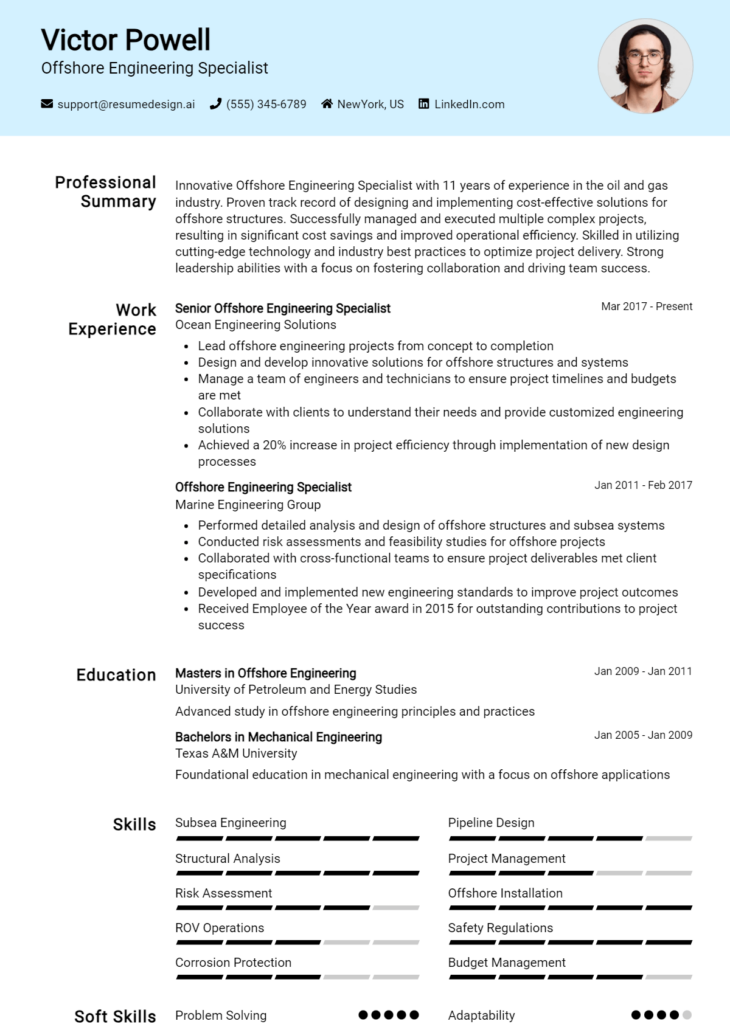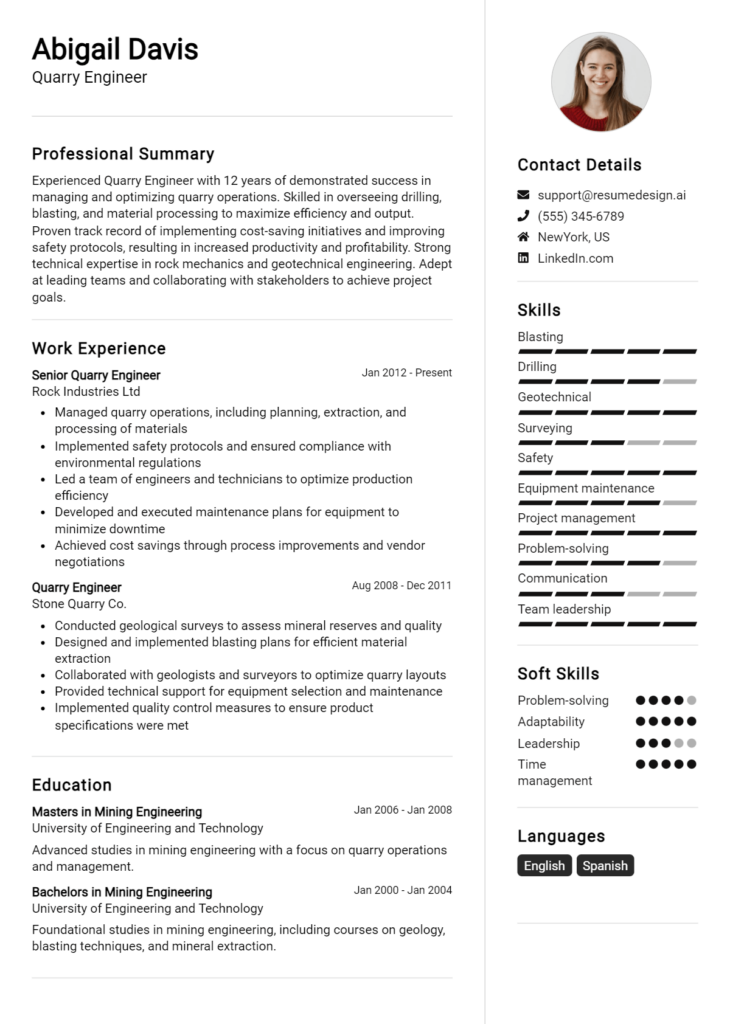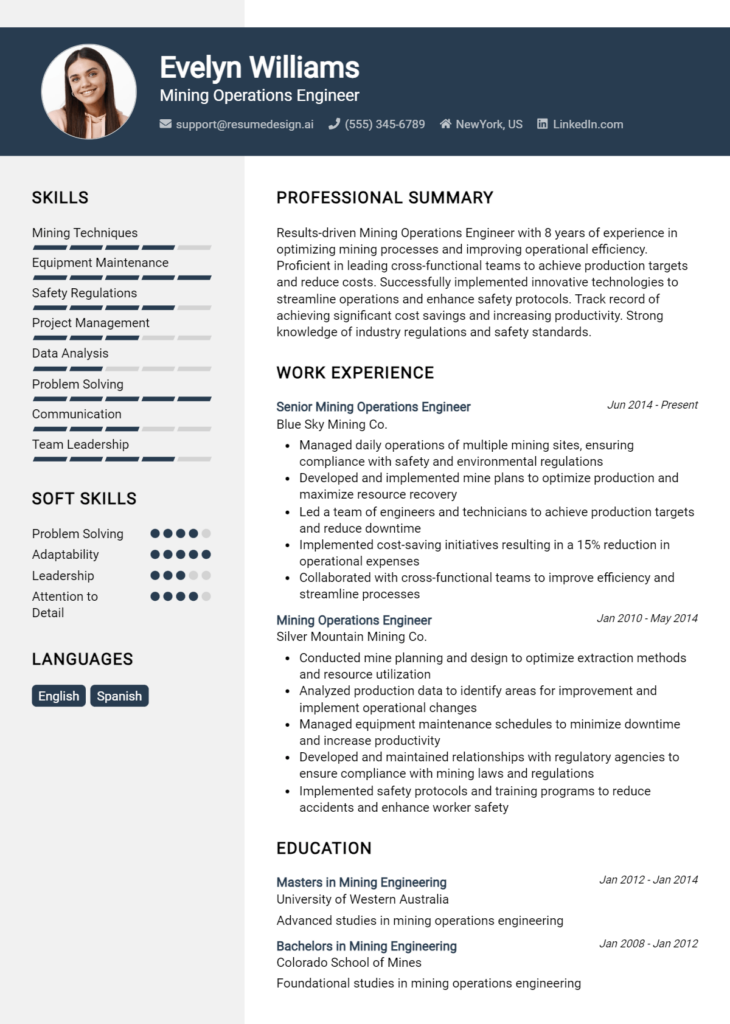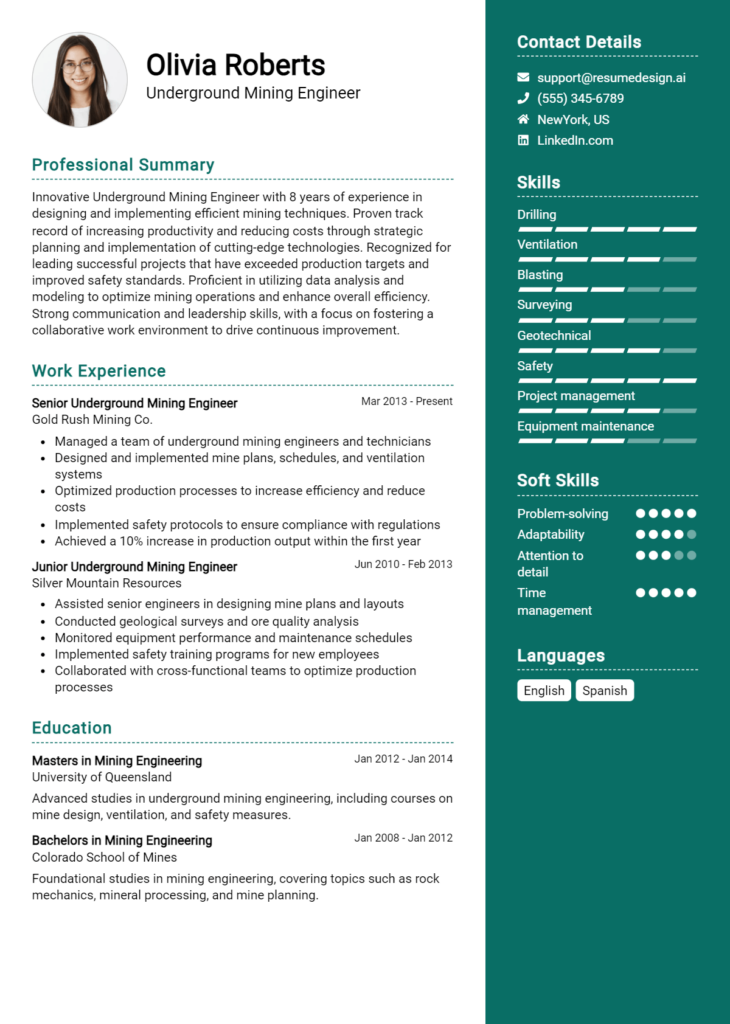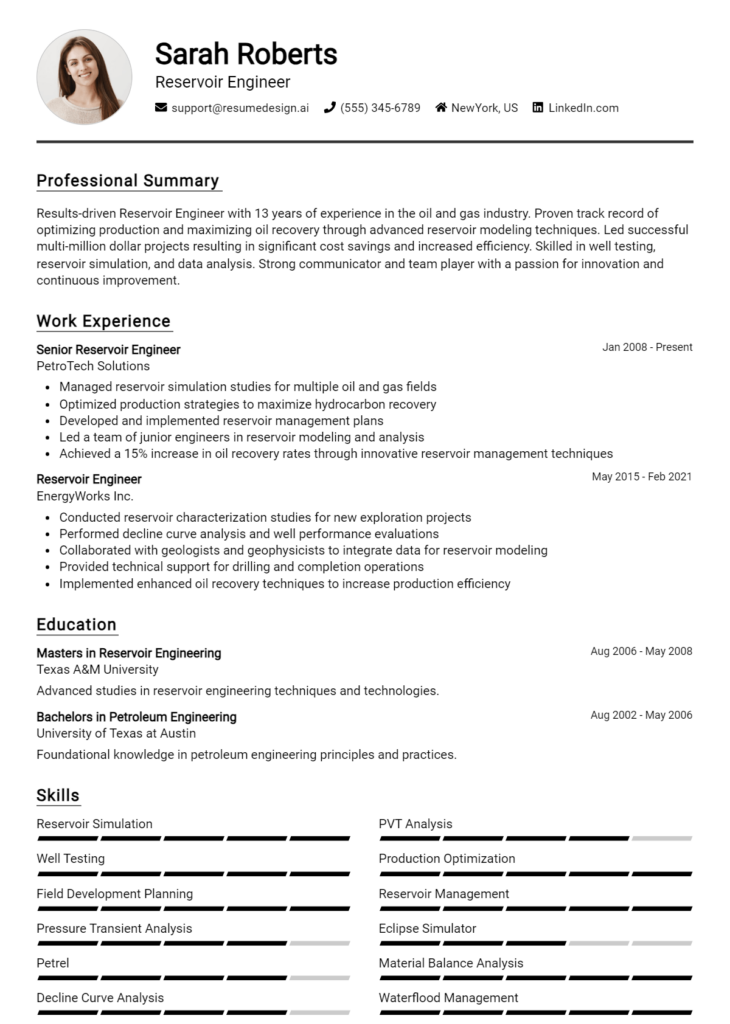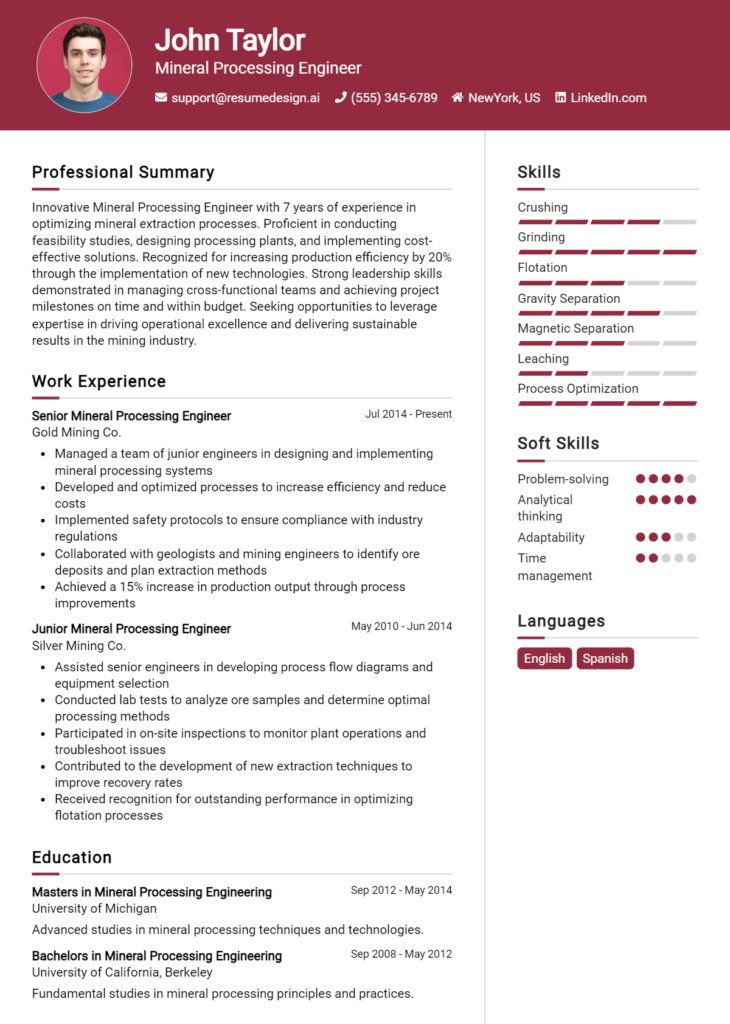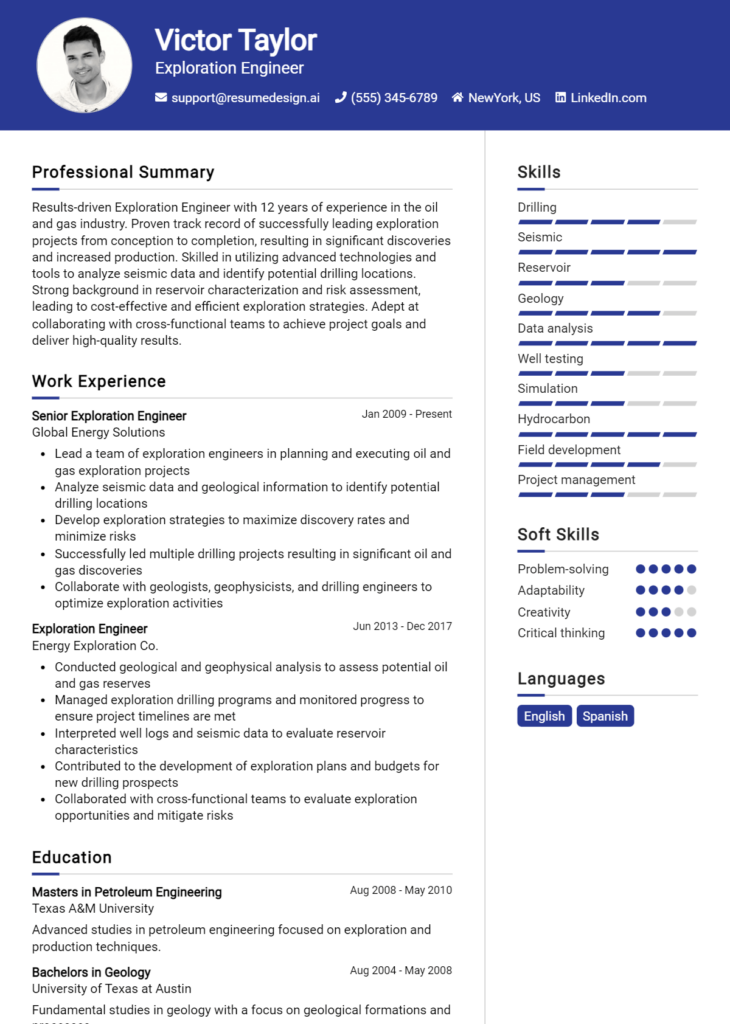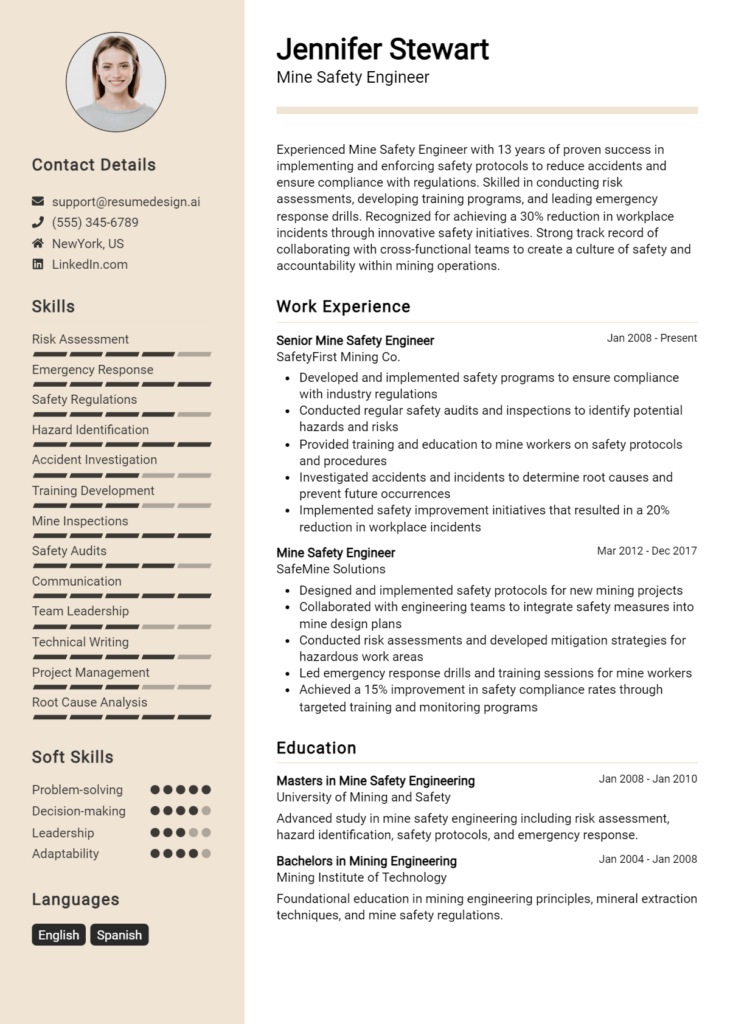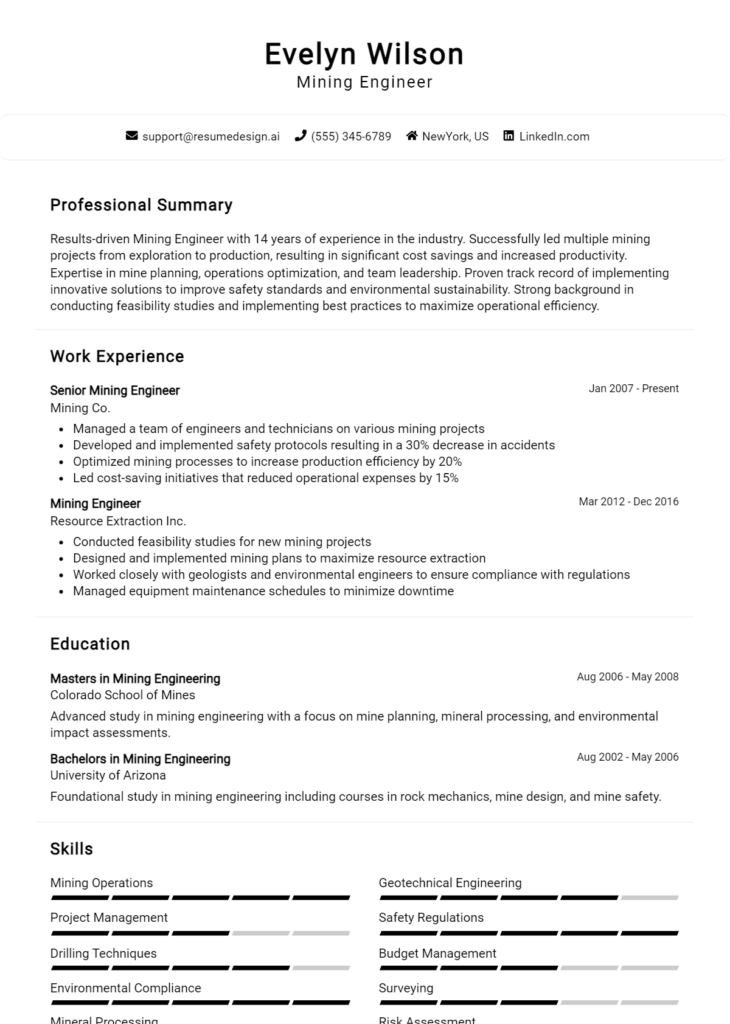Drilling Engineer Core Responsibilities
A Drilling Engineer plays a crucial role in overseeing drilling operations, ensuring they are executed safely, efficiently, and within budget. This position requires a blend of technical expertise, operational proficiency, and strong problem-solving skills to navigate challenges that arise during drilling projects. By collaborating with geologists, production teams, and safety personnel, Drilling Engineers ensure that organizational objectives are met. A well-crafted resume highlighting these qualifications can effectively demonstrate a candidate’s ability to contribute to the success of their projects and the overall goals of the organization.
Common Responsibilities Listed on Drilling Engineer Resume
- Design and implement drilling plans and programs.
- Conduct feasibility studies and risk assessments.
- Collaborate with geologists to analyze subsurface conditions.
- Monitor drilling performance and optimize operations.
- Ensure compliance with safety and environmental regulations.
- Manage drilling budgets and resources effectively.
- Provide technical support and training to field personnel.
- Evaluate and select drilling equipment and technologies.
- Analyze data from drilling operations for continuous improvement.
- Coordinate with cross-functional teams for project execution.
- Prepare detailed reports and documentation on drilling activities.
- Implement innovative approaches to enhance drilling efficiency.
High-Level Resume Tips for Drilling Engineer Professionals
In the competitive field of drilling engineering, a well-crafted resume is not just a summary of your work history; it is often the first impression you will make on a potential employer. A resume for a drilling engineer needs to effectively reflect your technical skills, industry knowledge, and notable achievements to stand out in a pool of candidates. It serves as a vital tool to showcase your qualifications and experience, making it essential to present yourself in the best light possible. This guide will provide practical and actionable resume tips specifically tailored for drilling engineer professionals, empowering you to demonstrate your value and secure your next opportunity.
Top Resume Tips for Drilling Engineer Professionals
- Tailor your resume for each job application by aligning your skills and experiences with the specific requirements outlined in the job description.
- Highlight your relevant experience in drilling operations, project management, and engineering design to showcase your expertise.
- Quantify your achievements with specific metrics, such as the amount of cost savings achieved or the percentage of efficiency improvements you implemented.
- Emphasize industry-specific skills such as well design, drilling fluid management, and risk assessment to demonstrate your technical proficiency.
- Include certifications and training relevant to drilling engineering, such as Well Control or Project Management Professional (PMP) certification.
- Use action verbs to convey your responsibilities and achievements, such as "designed," "implemented," or "optimized."
- Incorporate keywords from the job posting to enhance your resume's compatibility with Applicant Tracking Systems (ATS).
- Keep your resume clear and concise, ideally within one to two pages, ensuring that it is easy to read and comprehend.
- Showcase teamwork and leadership experiences, highlighting your ability to collaborate with cross-functional teams in challenging environments.
- Include a professional summary at the top of your resume that encapsulates your key skills and career goals in drilling engineering.
By implementing these tips, you can significantly increase your chances of landing a job in the drilling engineering field. A focused and well-structured resume not only highlights your qualifications but also helps you make a compelling case for why you are the ideal candidate for the position. Remember, your resume is your marketing tool—make it count!
Why Resume Headlines & Titles are Important for Drilling Engineer
In the competitive field of drilling engineering, a well-crafted resume headline or title serves as a critical first impression for hiring managers. This succinct phrase can instantly capture attention and encapsulate a candidate's most relevant qualifications, making it essential for standing out in a crowded applicant pool. A strong headline should be concise, focused, and directly aligned with the job being applied for, providing a clear snapshot of the candidate's expertise and value proposition at a glance.
Best Practices for Crafting Resume Headlines for Drilling Engineer
- Keep it concise: Aim for one impactful sentence or phrase.
- Be specific: Tailor the headline to reflect the specific role and skills required.
- Highlight key achievements: Include quantifiable metrics or notable accomplishments.
- Use relevant keywords: Incorporate industry-specific terminology that resonates with hiring managers.
- Showcase your expertise: Mention areas of specialization or unique skills.
- Avoid jargon: Use clear language that can be easily understood by all readers.
- Make it impactful: Use strong action words to convey confidence and capability.
- Align with the job description: Emphasize qualities that match the requirements of the job posting.
Example Resume Headlines for Drilling Engineer
Strong Resume Headlines
Innovative Drilling Engineer with 10+ Years of Experience in Deepwater Projects
Results-Driven Drilling Engineer Specializing in Cost-Effective Solutions and Safety Compliance
Expert Drilling Engineer with Proven Track Record in Reducing Operational Costs by 25%
Weak Resume Headlines
Drilling Engineer Seeking Job
Experienced Professional Looking for Opportunities
Strong headlines are effective because they convey specific qualifications and achievements that are immediately relevant to the role of a drilling engineer, making a compelling case for the candidate's fit. In contrast, weak headlines fail to impress due to their vagueness and lack of focus, which do not provide hiring managers with any clear indication of the candidate’s strengths or relevance to the position. A well-crafted headline can be the difference between getting noticed and being overlooked in a highly competitive job market.
Writing an Exceptional Drilling Engineer Resume Summary
A well-crafted resume summary is a critical component for a Drilling Engineer as it serves as the first impression for hiring managers. In a competitive job market, a strong summary quickly captures attention by effectively showcasing key skills, relevant experience, and notable accomplishments that align with the specific requirements of the role. It should be concise and impactful, providing a snapshot of the candidate's qualifications that encourages further exploration of their resume. Tailoring the summary to the job description not only demonstrates the candidate's attention to detail but also highlights their suitability for the position.
Best Practices for Writing a Drilling Engineer Resume Summary
- Quantify achievements: Use specific numbers to demonstrate the impact of your work, such as cost savings, efficiency improvements, or successful project completions.
- Focus on key skills: Highlight technical skills and competencies relevant to drilling engineering, such as project management, drilling techniques, and safety protocols.
- Tailor the summary: Customize your summary for each job application by aligning it with the job description and required qualifications.
- Keep it concise: Aim for 3-5 sentences that deliver maximum information without overwhelming the reader.
- Use industry terminology: Incorporate relevant jargon and terms that are familiar to hiring managers in the drilling sector.
- Showcase leadership qualities: If applicable, mention experiences that demonstrate your ability to lead teams and manage projects effectively.
- Highlight problem-solving skills: Emphasize your capacity to troubleshoot issues and implement effective solutions in challenging drilling environments.
- Maintain a professional tone: Ensure that the language used is formal and professional, reflecting the seriousness of the engineering field.
Example Drilling Engineer Resume Summaries
Strong Resume Summaries
Dynamic Drilling Engineer with over 8 years of experience in designing and executing drilling programs for offshore oil and gas projects. Successfully reduced drilling costs by 20% through the implementation of innovative techniques and optimized resource management.
Results-oriented Drilling Engineer skilled in advanced drilling methodologies and project management. Led a team that achieved a 30% increase in drilling efficiency while ensuring compliance with safety regulations, resulting in zero accidents over the past two years.
Experienced Drilling Engineer specializing in horizontal drilling with a proven track record of managing multi-million dollar projects. Improved well delivery times by 15% through strategic planning and collaboration with cross-functional teams.
Weak Resume Summaries
I am a drilling engineer looking for a new position where I can apply my skills and experience.
Dedicated professional with experience in the drilling industry and a desire to contribute to a successful team.
The strong resume summaries are effective because they provide specific details about the candidate's experience, quantify achievements, and highlight relevant skills directly related to the role of a Drilling Engineer. In contrast, the weak summaries lack specificity, are overly generic, and do not convey measurable accomplishments, making them less likely to capture the interest of hiring managers.
Work Experience Section for Drilling Engineer Resume
The work experience section of a Drilling Engineer resume is crucial as it serves as a testament to a candidate's technical expertise, leadership qualities, and ability to deliver high-quality results in challenging environments. This section provides potential employers with insights into the candidate’s hands-on experience, showcasing their capability to manage drilling operations, optimize processes, and ensure safety compliance. It is essential to quantify achievements, such as reductions in drilling costs or improvements in efficiency, as this not only demonstrates the impact of the candidate's work but also aligns their experience with industry standards, making them a more attractive hire.
Best Practices for Drilling Engineer Work Experience
- Highlight specific technical skills related to drilling operations and technologies.
- Quantify results, such as reduced drilling times or cost savings achieved.
- Demonstrate leadership by detailing experiences in managing teams or projects.
- Include relevant certifications or training that enhance your qualifications.
- Align experiences with industry standards and best practices to showcase your knowledge.
- Use action verbs to convey a sense of proactivity and impact.
- Focus on collaborative projects that emphasize teamwork and communication skills.
- Tailor the content to the specific job you are applying for, highlighting relevant experiences.
Example Work Experiences for Drilling Engineer
Strong Experiences
- Led a cross-functional team to successfully implement a new drilling technique, resulting in a 15% reduction in drilling time and a cost saving of $200,000.
- Managed a field drilling project with a budget of $5 million, achieving all milestones on time and under budget while enhancing safety protocols that reduced incidents by 30%.
- Developed and executed a comprehensive drilling optimization plan that improved penetration rates by 25%, significantly increasing overall project efficiency.
- Collaborated with geologists and engineers to design and execute a multi-well drilling program that resulted in a 40% increase in production rates over the previous year.
Weak Experiences
- Worked on drilling projects with no specific details about contributions or outcomes.
- Assisted in various tasks without highlighting any leadership or technical skills.
- Participated in team meetings and discussions, but did not provide quantifiable results or impact.
- Involved in drilling operations with vague descriptions that lack context or significance.
The examples listed as strong experiences stand out because they include quantifiable outcomes, demonstrate technical leadership, and highlight successful collaboration within teams. In contrast, the weak experiences lack specific achievements and fail to convey the candidate's contributions or impact, making them less compelling to potential employers. Strong experiences provide clear evidence of a candidate's capabilities, while weak experiences leave too much to interpretation, ultimately weakening the overall resume.
Education and Certifications Section for Drilling Engineer Resume
The education and certifications section of a Drilling Engineer resume plays a crucial role in demonstrating the candidate's foundational knowledge, specialized skills, and commitment to professional development in the field. This section not only showcases the academic background that underpins the technical expertise required for drilling engineering but also highlights relevant industry certifications that validate the candidate's competencies. Moreover, including relevant coursework and specialized training reflects ongoing efforts to stay abreast of advancements in technology and best practices within the industry. Ultimately, a well-crafted education and certifications section significantly enhances the candidate's credibility and alignment with the specific demands of the drilling engineer role.
Best Practices for Drilling Engineer Education and Certifications
- Focus on relevant degrees: Highlight degrees in Petroleum Engineering, Geology, or related fields that directly relate to the drilling engineer role.
- Include industry-recognized certifications: List certifications such as the Certified Petroleum Engineer (CPE) or certifications from organizations like the Society of Petroleum Engineers (SPE).
- Showcase continuous learning: Mention any recent training, workshops, or courses that keep your skills current with industry trends.
- Provide specific coursework: Detail relevant coursework that supports your technical skills, particularly in drilling technology, reservoir engineering, and fluid mechanics.
- List advanced degrees: If applicable, include master's degrees or PhDs that can set you apart from other candidates.
- Use clear formatting: Organize your education and certifications in a clear, concise manner for easy readability.
- Tailor to the job description: Customize your education and certification list to align with the requirements and preferences stated in the job listing.
- Be honest and accurate: Ensure all information is truthful and reflects your abilities and qualifications accurately.
Example Education and Certifications for Drilling Engineer
Strong Examples
- Bachelor of Science in Petroleum Engineering, University of Texas at Austin, 2018
- Certified Petroleum Engineer (CPE), Society of Petroleum Engineers, 2021
- Advanced Drilling Techniques Course, International Association of Drilling Contractors, 2022
- Master's Degree in Geosciences, Colorado School of Mines, 2020
Weak Examples
- Bachelor of Arts in English Literature, University of California, 2015
- Certification in Basic First Aid, Red Cross, 2019
- High School Diploma, ABC High School, 2012
- Outdated Certification in Drilling Operations, 2015
The strong examples are considered robust because they directly align with the qualifications sought in a drilling engineer, showcasing relevant academic credentials and industry-recognized certifications that enhance the candidate's suitability for the role. Conversely, the weak examples are deemed ineffective as they highlight irrelevant degrees and outdated certifications that do not support the technical expertise required for a drilling engineer position. This stark contrast underscores the importance of selecting education and certifications that are pertinent to the field of drilling engineering.
Top Skills & Keywords for Drilling Engineer Resume
As a Drilling Engineer, the importance of showcasing relevant skills on your resume cannot be overstated. The oil and gas industry is highly competitive and technical, making it essential for candidates to highlight their proficiency in both hard and soft skills. A well-crafted resume that emphasizes these abilities not only demonstrates your qualifications but also your commitment to the role. Potential employers look for specific skills that align with the demands of drilling operations, safety protocols, and project management. By effectively presenting your skill set, you can significantly enhance your chances of landing an interview and advancing your career in this dynamic field.
Top Hard & Soft Skills for Drilling Engineer
Soft Skills
- Problem-solving
- Communication
- Teamwork
- Leadership
- Adaptability
- Time management
- Attention to detail
- Critical thinking
- Interpersonal skills
- Decision-making
- Conflict resolution
- Negotiation skills
- Emotional intelligence
- Organizational skills
Hard Skills
- Drilling engineering principles
- Well design and planning
- Project management
- Data analysis and interpretation
- Software proficiency (e.g., AutoCAD, drilling simulators)
- Knowledge of drilling fluids
- Reservoir engineering
- Safety regulations and compliance
- Cost estimation and budgeting
- Operations management
- Geomechanics
- Well control techniques
- Environmental regulations
- Risk assessment and management
For more insights on how to effectively incorporate these skills into your resume, as well as how to highlight your work experience, explore the resources available to help you stand out in your job search.
Stand Out with a Winning Drilling Engineer Cover Letter
Dear [Hiring Manager's Name],
I am writing to express my interest in the Drilling Engineer position at [Company Name], as advertised on [Job Board/Company Website]. With a degree in Petroleum Engineering and over [X years] of hands-on experience in drilling operations, I am confident in my ability to contribute effectively to your team. My background in designing drilling programs, optimizing drilling performance, and ensuring compliance with safety and environmental regulations aligns well with the goals of [Company Name].
In my previous role at [Previous Company Name], I successfully led a team to implement innovative drilling techniques that resulted in a [X%] reduction in drilling costs while maintaining high safety standards. My expertise in using advanced drilling software and my ability to analyze geological data allowed us to enhance operational efficiency and minimize downtime. Additionally, my strong communication skills fostered collaboration between cross-functional teams, ensuring that all stakeholders were aligned and informed throughout the drilling process.
I am particularly drawn to [Company Name] because of its commitment to sustainable drilling practices and its pioneering advancements in technology. I am excited about the opportunity to bring my skills in project management and problem-solving to your esteemed company. I am eager to leverage my technical knowledge and passion for the drilling industry to contribute to [Company Name]'s continued success and innovation.
Thank you for considering my application. I look forward to the opportunity to discuss how my experience and vision align with the goals of [Company Name]. I am enthusiastic about the possibility of joining your team and contributing to exciting new projects in the drilling sector.
Sincerely,
[Your Name]
[Your Contact Information]
Common Mistakes to Avoid in a Drilling Engineer Resume
When crafting a resume for a Drilling Engineer position, it's essential to present your skills and experiences effectively. However, many candidates make common mistakes that can undermine their chances of landing an interview. Understanding these pitfalls can help you create a more compelling and professional resume that stands out to employers in the competitive oil and gas industry.
Using a Generic Template: Many applicants rely on one-size-fits-all templates, which can make their resumes look unoriginal. Tailoring your resume to the specific job description demonstrates your genuine interest and attention to detail.
Neglecting Keywords: Failing to include relevant industry keywords can result in your resume being overlooked by Applicant Tracking Systems (ATS). Incorporate terms from the job posting to ensure your resume aligns with the employer's requirements.
Listing Responsibilities Instead of Achievements: Simply detailing job duties can make your experience seem mundane. Focus on quantifiable achievements and the impact of your work, such as cost savings or improved drilling efficiency.
Lack of Specificity: Vague descriptions of your experience can leave hiring managers confused. Provide specific details about your projects, including technologies used, the scale of operations, and results achieved.
Ignoring Education and Certifications: In a technical field like drilling engineering, neglecting to highlight your educational background and relevant certifications can be detrimental. Ensure these credentials are prominently featured, as they validate your expertise.
Poor Formatting: A cluttered or unorganized resume can distract from your qualifications. Use clear headings, bullet points, and consistent formatting to create a professional and easy-to-read document.
Not Tailoring the Summary Statement: A generic summary statement fails to capture your unique qualifications. Customize this section to reflect your specific skills and experiences relevant to the drilling engineering role.
Overlooking Soft Skills: While technical skills are critical, soft skills such as communication, teamwork, and problem-solving are equally important. Highlight these skills to demonstrate your ability to collaborate effectively in multidisciplinary teams.
Conclusion
As a Drilling Engineer, your expertise in planning, designing, and implementing drilling operations is vital to the success of oil and gas exploration projects. Throughout this article, we have highlighted the essential skills and qualifications necessary for this role, including proficiency in drilling technologies, project management, safety protocols, and environmental considerations.
We also discussed the importance of staying current with industry trends and continuously developing your technical skills to enhance your career prospects. Networking with industry professionals and participating in relevant training programs can further bolster your resume, making you a more attractive candidate for potential employers.
Now more than ever, it’s crucial to ensure your Drilling Engineer resume clearly reflects your qualifications and experiences. Take the time to review and update your resume, showcasing your skills and accomplishments in the best light. To assist you in this process, consider utilizing our resources:
- Explore our resume templates to find a design that suits your professional image.
- Use our resume builder to easily create a polished and professional resume tailored to your career goals.
- Check out our resume examples to gain inspiration from successful Drilling Engineer resumes.
- Don’t forget to craft a compelling cover letter with our cover letter templates to accompany your resume.
Take action today to enhance your resume and position yourself for success in your career as a Drilling Engineer!

